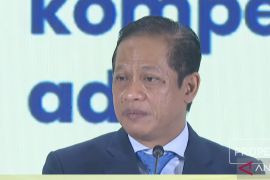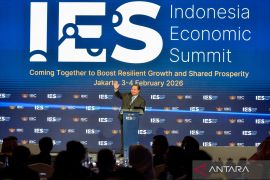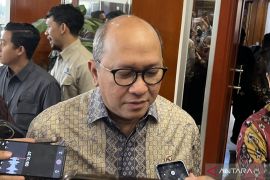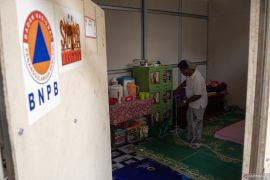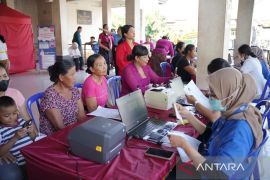The efforts to extend contract with rice exporting countries such as Thailand and Vietnam are being made to ensure constant supplies and the existence of adequate reserve stocks for times of crisis.Jakarta (ANTARA News) - Indonesia where rice is the main staple food of its 237 million population is seeking to extend its rice purchasing contracts with rice exporting countries.
The efforts to extend contract with rice exporting countries such as Thailand and Vietnam are being made to ensure constant supplies and the existence of adequate reserve stocks for times of crisis.
External Trade Director General of the Trade Ministry Deddy Saleh said here on Thursday the government was planning to extend its rice procurement cooperation agreement with Thailand which will expire this year.
The Indonesian government has sent a draft memorandum of understanding on the extension of rice procurement cooperation to the Thai government. "The rice procurement agreement with Thailand is now almost expired. We have officially sent a letter for the extension of the rice procurement cooperation. We are waiting for the Thai government`s response," the director general said.
In the draft memorandum of understanding, the Indonesian government has asked an extension of the procurement agreement for two years. "The volume of rice to be procured, if I am not mistaken, is between 500 thousand and one million tons," Deddy Saleh said.
He said that the government was also asking for the extension of rice procurement agreement with the Vietnamese government. The agreement on the rice procurement with the Vietnamese government will expire in 2012.
"We have also sent a draft memorandum of understanding to the Vietnamese government, and we are also waiting for its response," the director general added.
So far, Indonesia which has a total need for rice per annum of about 31 million tons, has always imported rice to increase its stocks at home from Vietnam or Thailand.
Although Indonesia produces relatively large volume of rice, yet it still needs to import rice to increase its stocks for market operations when prices are showing an upward trend during certain times at home such as in the face the fasting month or when harvests fail.
This year, for example, the government has allowed the importation of rice. In order to prevent the decreasing stocks in Bulog`s warehouses, the government has given the green light for the state-owned firm (Bulog) to import rice.
"We have signed a contract for the purchase of 500,000 tons rice with Vinafood 2, one of the Vietnamese exporters. The rice from Vietnam is expected to be kept at Bulog warehouses," Bulog President Director Sutarto Alimoeso said recently.
"Food production, rice in particular, is prone to problems. Thailand and Vietnam are big exporters but some other countries also have rice surplus such as Pakistan, India, Myanmar and Cambodia," Alimoeso said.
The Logistics Agency chief said there was no problem if Indonesia tried to explore cooperation on rice procurement with India or Pakistan for example as it did not want to face a risk with regard to rice supplies.
According to Director General Deddy Saleh, the government together with the state-owned logistics agency Bulog is also now exploring cooperation on rice procurement with the governments of India and Pakistan.
"With Pakistan, we have also sent a draft memorandum of understanding. When they meet next week, the Indonesian trade minister and her Pakistani counterpart, (vice trade minister) are likely to discuss the matter," the director general said.
The government has also expressed its wish to cooperate with India in the purchase of rice.
"We have tried to explore the cooperation with the Indian trade ministry but it is not yet enough so that we still need to discuss it with the ministry of agriculture in that country. We still have to assure with whom we are going to have a discussion or negotiation regarding the plan rice procurement cooperation," Deddy said.
The efforts are being made to find alternative sources of rice imports which would possibly be needed to secure national rice stocks at time domestic rice production is being disturbed.
Based on the Central Bureau of Statistics (BPS)`s forecast II, the country this year is expected to enjoy a rice production surplus of 2.4 percent or an increase by 1.17 percent from that in 2010.
"This is ironical. The price is increasing while there is a surplus. I suspect that traders are hoarding rice," Agriculture Minister Suswono said meanwhile.
In the meantime, agriculture observer Bungaran Saragih has suggested that the government reduce the consumption rate of rice in order to reduce dependence on rice in the face of increase in number of population.
For this purposes, the government is expected to cut the rice per capita consumption of the people from the current 130 kg a year to 60 kg.
"The government must be optimistic that it will be able to keep down per capita rice consumption to 60 kg per year in the next 20 years, the more so because the country is projected to have a population of 300 million in 2030," Bungaran Saragih said at a food security seminar in Jakarta recently.
With an annual population growth rate of 1 percent, the Indonesian population would increase by 2.4 million per year. Consequently, demand for rice would continue to increase and rice prices would become high.
If per capita rice consumption could be lowered to 100 kg from 130 kg a year the country would be able to reduce rice consumption by 30 percent, he said.(*)
Reporter: by andi abdussalam
Editor: Heru Purwanto
Copyright © ANTARA 2011




